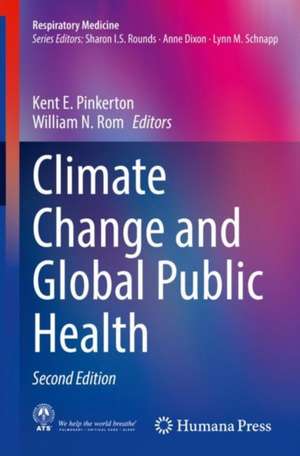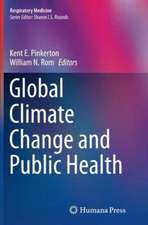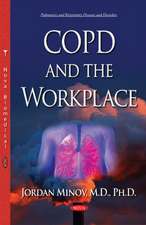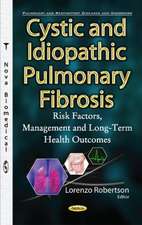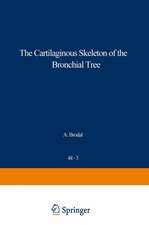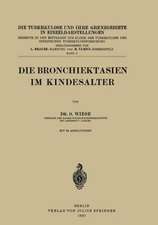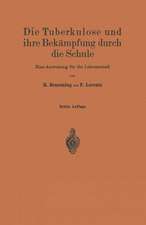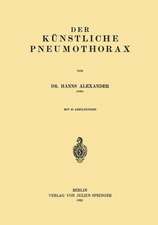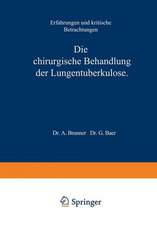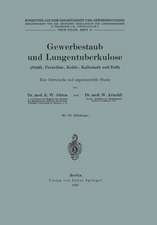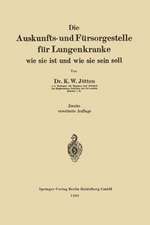Climate Change and Global Public Health: Respiratory Medicine
Editat de Kent E. Pinkerton, William N. Romen Limba Engleză Paperback – 24 noi 2021
This second edition is fully updated to include the latest research by international experts on topics such as heat waves causing critical care-related diseases, climate-driven air pollution increases, and high-level ozone and ozone exposure linked to idiopathic pulmonary fibrosis, lung cancer, and acute lower respiratory infection. Seven new chapters have also been added on extremeweather and agricultural safety in California; desert dust effects on lung health; climate policy and the EPA; California's integrated approach to air quality and climate change; integrating climate change, the environment, and sustainability themes into professional health science courses; and the role of the physician as climate advocate. This is an ideal guide for all pulmonologists and health professionals treating patients with pulmonary disease.
| Toate formatele și edițiile | Preț | Express |
|---|---|---|
| Paperback (1) | 757.59 lei 38-44 zile | |
| Springer International Publishing – 24 noi 2021 | 757.59 lei 38-44 zile | |
| Hardback (1) | 1063.60 lei 38-44 zile | |
| Springer International Publishing – 24 noi 2020 | 1063.60 lei 38-44 zile |
Din seria Respiratory Medicine
- 5%
 Preț: 910.09 lei
Preț: 910.09 lei - 5%
 Preț: 719.02 lei
Preț: 719.02 lei - 5%
 Preț: 805.89 lei
Preț: 805.89 lei - 5%
 Preț: 1111.61 lei
Preț: 1111.61 lei - 5%
 Preț: 1098.12 lei
Preț: 1098.12 lei - 5%
 Preț: 939.25 lei
Preț: 939.25 lei - 5%
 Preț: 1032.64 lei
Preț: 1032.64 lei - 5%
 Preț: 823.28 lei
Preț: 823.28 lei - 5%
 Preț: 654.11 lei
Preț: 654.11 lei - 5%
 Preț: 901.10 lei
Preț: 901.10 lei - 5%
 Preț: 719.38 lei
Preț: 719.38 lei - 5%
 Preț: 1043.97 lei
Preț: 1043.97 lei - 5%
 Preț: 778.44 lei
Preț: 778.44 lei - 5%
 Preț: 1632.41 lei
Preț: 1632.41 lei - 5%
 Preț: 718.65 lei
Preț: 718.65 lei - 5%
 Preț: 1419.39 lei
Preț: 1419.39 lei - 5%
 Preț: 781.17 lei
Preț: 781.17 lei - 5%
 Preț: 722.69 lei
Preț: 722.69 lei - 5%
 Preț: 718.46 lei
Preț: 718.46 lei - 5%
 Preț: 524.63 lei
Preț: 524.63 lei - 5%
 Preț: 1612.30 lei
Preț: 1612.30 lei - 5%
 Preț: 1101.58 lei
Preț: 1101.58 lei - 5%
 Preț: 1101.58 lei
Preț: 1101.58 lei - 5%
 Preț: 720.84 lei
Preț: 720.84 lei - 5%
 Preț: 779.16 lei
Preț: 779.16 lei - 5%
 Preț: 1417.29 lei
Preț: 1417.29 lei - 5%
 Preț: 1100.30 lei
Preț: 1100.30 lei - 5%
 Preț: 989.22 lei
Preț: 989.22 lei - 5%
 Preț: 780.45 lei
Preț: 780.45 lei - 5%
 Preț: 853.05 lei
Preț: 853.05 lei - 5%
 Preț: 1621.44 lei
Preț: 1621.44 lei - 5%
 Preț: 1042.69 lei
Preț: 1042.69 lei - 5%
 Preț: 721.77 lei
Preț: 721.77 lei - 5%
 Preț: 1601.52 lei
Preț: 1601.52 lei - 5%
 Preț: 370.21 lei
Preț: 370.21 lei - 5%
 Preț: 1108.87 lei
Preț: 1108.87 lei - 5%
 Preț: 1030.17 lei
Preț: 1030.17 lei - 5%
 Preț: 1302.37 lei
Preț: 1302.37 lei - 5%
 Preț: 1296.68 lei
Preț: 1296.68 lei - 5%
 Preț: 781.17 lei
Preț: 781.17 lei - 5%
 Preț: 1167.58 lei
Preț: 1167.58 lei - 5%
 Preț: 851.05 lei
Preț: 851.05 lei
Preț: 757.59 lei
Preț vechi: 797.45 lei
-5% Nou
Puncte Express: 1136
Preț estimativ în valută:
144.98€ • 150.81$ • 119.69£
144.98€ • 150.81$ • 119.69£
Carte tipărită la comandă
Livrare economică 10-16 aprilie
Preluare comenzi: 021 569.72.76
Specificații
ISBN-13: 9783030547486
ISBN-10: 3030547485
Pagini: 605
Ilustrații: XV, 605 p. 116 illus., 103 illus. in color.
Dimensiuni: 155 x 235 x 34 mm
Greutate: 1.05 kg
Ediția:2nd ed. 2021
Editura: Springer International Publishing
Colecția Humana
Seria Respiratory Medicine
Locul publicării:Cham, Switzerland
ISBN-10: 3030547485
Pagini: 605
Ilustrații: XV, 605 p. 116 illus., 103 illus. in color.
Dimensiuni: 155 x 235 x 34 mm
Greutate: 1.05 kg
Ediția:2nd ed. 2021
Editura: Springer International Publishing
Colecția Humana
Seria Respiratory Medicine
Locul publicării:Cham, Switzerland
Cuprins
Introduction: consequences of global warming to planetary and human health.- Climate variability and change data and information for global public health.- Climate change: updates on recent global and United States temperature anomalies and impacts to water, forests and environmental health.- Eyewitness to climate change.- Arctic connections to global warming and health.- Assessing the health risks of climate change.- Heat waves and rising temperatures: Human health impacts and the determinants of vulnerability.- Climate, air quality and allergy: emerging methods for detecting linkages.- The human health co-benefits of air quality improvements associated with climate change mitigation.- Asthma, hayfever, pollen, & climate change.- California and climate changes: an update.- Vector-borne diseases in a changing climate and world.- Dengue fever and climate change.- Climate variability and change: food, water and societal impacts.- Hurricanes and health: vulnerabilityin an age of climate change.- The impact of climate change and extreme weather conditions on agricultural health and safety in california.- Household air pollution from cookstoves: impacts on health and climate.- Biomass fuel and lung diseases: an Indian perspective.- Climate change and women’s health: risks and opportunities.- The impact of climate change on public health in small island states and caribbean countries.- Global climate change, desertification, and its consequences in Turkey and the Middle East.- Climate change and the risk of desertification with a focus in the United States.- Federal Programs in climate change and health research.- Management of climate change adaptation at the United States centers for disease control and prevention.- Rules, rulings, and repeals: the shifting state of climate policy at U.S. EPA.- California’s integrated approach to air quality and climate change.- Climate change and public health interventions.- Integrating climate change, the environment, and sustainability themes into professional health sciences courses: a case study across a university system.- The physician’s response to climate change.
Notă biografică
Kent E. Pinkerton, PhD, is a Professor in the Department of Pediatrics, School of Medicine and Professor In-Residence, Department of Anatomy, Physiology and Cell Biology, School of Veterinary Medicine at UC Davis. He is also Director of the Center for Health and the Environment at the John Muir Institute of the Environment. Dr. Pinkerton’s research is on health effects of environmental air pollutants on lung structure and function, the interaction of gases and airborne particles within specific sites and cell populations of the lungs in acute and chronic lung injury, and the effects of environmental tobacco smoke on lung growth and development. He is also a member of the Assembly for Environmental and Occupational Health of the American Thoracic Society.
William N. Rom, MD, MPH, is the Sol and Judith Bergstein Professor of Medicine and Environmental Medicine, Emeritus. He is currently Research Scientist at NYU School of Global Public Health. He teaches Climate Change and Global Public Health and Environmental Health in a Global World. He is the former Director of the NYU Division of Pulmonary, Critical Care, and Sleep Medicine and Bellevue Chest Service (1989-2014). The Division has 75 full-time faculty and over 25 fellows. His research is on early detection of lung cancer, environmental lung disease, TB/AIDS, and air pollution. He and his faculty have been awarded over $142M in NIH and CDC grants over the years. He is editor of 4 editions of Environmental and Occupational Medicine and 2 editions of Tuberculosis. He has published over 350 peer reviewed articles. He was Founder and former Chair of the American Thoracic Society's Environmental Health Policy Committee that advocates science-based air pollution standards. He has been a Fellow in the Department of Interior on National Parks and was a Senior Investigator at the NHLBI, NIH for 6 years deciphering the mechanisms of asbestosis. He was a Legislative Fellow forSenator Hillary Rodham Clinton and wrote the Family Asthma Bill, the Caribbean Wilderness Act, World Trade Center health-related dust programs, and the National Environmental Public Health Tracking Bill. He was the Founder and Director of the Rocky Mountain Center for Occupational and Environmental Health at the University of Utah.
William N. Rom, MD, MPH, is the Sol and Judith Bergstein Professor of Medicine and Environmental Medicine, Emeritus. He is currently Research Scientist at NYU School of Global Public Health. He teaches Climate Change and Global Public Health and Environmental Health in a Global World. He is the former Director of the NYU Division of Pulmonary, Critical Care, and Sleep Medicine and Bellevue Chest Service (1989-2014). The Division has 75 full-time faculty and over 25 fellows. His research is on early detection of lung cancer, environmental lung disease, TB/AIDS, and air pollution. He and his faculty have been awarded over $142M in NIH and CDC grants over the years. He is editor of 4 editions of Environmental and Occupational Medicine and 2 editions of Tuberculosis. He has published over 350 peer reviewed articles. He was Founder and former Chair of the American Thoracic Society's Environmental Health Policy Committee that advocates science-based air pollution standards. He has been a Fellow in the Department of Interior on National Parks and was a Senior Investigator at the NHLBI, NIH for 6 years deciphering the mechanisms of asbestosis. He was a Legislative Fellow forSenator Hillary Rodham Clinton and wrote the Family Asthma Bill, the Caribbean Wilderness Act, World Trade Center health-related dust programs, and the National Environmental Public Health Tracking Bill. He was the Founder and Director of the Rocky Mountain Center for Occupational and Environmental Health at the University of Utah.
Textul de pe ultima copertă
This book is a guide to the research, findings, and discussions of US and international experts on climate change and respiratory health. Since the publication of the first edition, climate change has been increasingly acknowledged as being directly related to the prevalence and incidence of respiratory morbidity. Evidence is increasing that climate change does drive respiratory disease onset and exacerbation as a result of increased ambient and indoor air pollution, desertification, heat stress, wildfires, and the geographic and temporal spread of pollens, molds and infectious agents.
This second edition is fully updated to include the latest research by international experts on topics such as heat waves causing critical care-related diseases, climate-driven air pollution increases, and high-level ozone and ozone exposure linked to idiopathic pulmonary fibrosis, lung cancer, and acute lower respiratory infection. Seven new chapters have also been added on extreme weather and agricultural safety in California; desert dust effects on lung health; climate policy and the EPA; California's integrated approach to air quality and climate change; integrating climate change, the environment, and sustainability themes into professional health science courses; and the role of the physician as climate advocate. This is an ideal guide for all pulmonologists and health professionals treating patients with pulmonary disease.
This second edition is fully updated to include the latest research by international experts on topics such as heat waves causing critical care-related diseases, climate-driven air pollution increases, and high-level ozone and ozone exposure linked to idiopathic pulmonary fibrosis, lung cancer, and acute lower respiratory infection. Seven new chapters have also been added on extreme weather and agricultural safety in California; desert dust effects on lung health; climate policy and the EPA; California's integrated approach to air quality and climate change; integrating climate change, the environment, and sustainability themes into professional health science courses; and the role of the physician as climate advocate. This is an ideal guide for all pulmonologists and health professionals treating patients with pulmonary disease.
Caracteristici
Addresses direct and indirect adverse impacts on respiratory health as a result of climate change Fully updated edition with seven new chapters on topics such as climate adaptation and the role of the physician as climate advocate Contributors are domestic and international experts on respiratory health and climate change
